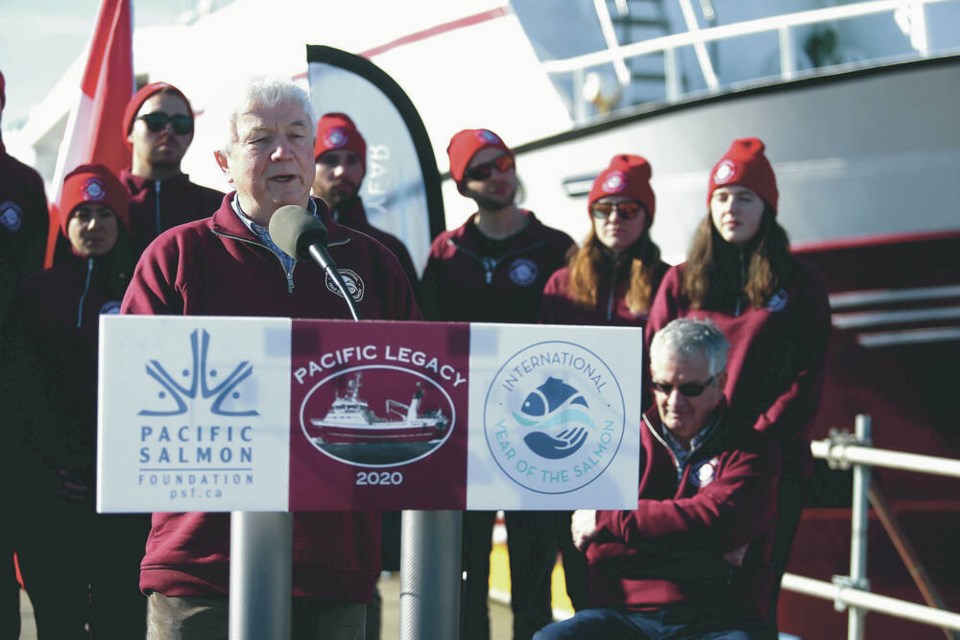Massive changes in the Pacific Ocean’s ecosystem in recent years are affecting salmon in ways never seen before, says a Nanaimo-based fisheries scientist.
In 2020, there was a 37 per cent drop in the total catch by all salmon-producing countries, said Richard Beamish, adding a drop of that size “had never occurred in the 100-year history of our fishery.”
“Everything was back to normal in 2021 and then in 2022 there was another collapse, by about 27 per cent among all the countries with Pacific salmon,” he said.
“Then in 2023, we saw almost record catches again — huge returns with pink salmon throughout the Pacific and Russia. In Alaska and even in B.C., we got good catches.”
But while Alaska and Russia saw catches at record levels, the sizes of the fish are the smallest ever, he said.
“What should be clear to everybody is that there’s a lot more that we need to know about Pacific salmon if we are going to be what I call professional stewards in the future of ecosystem changes,” said Beamish.
“To do that, you need to understand more about what regulates salmon. We really know relatively little about the ocean life of salmon.”
Beamish is calling for international teams of researchers to co-ordinate their efforts to discover what’s happening in the ocean.
Beamish, scientist emeritus with the federal Department of Fisheries and Oceans, and Brian Riddell, science adviser with the Pacific Salmon Foundation who also spent many years with the federal Fisheries Department, were recently jointly awarded the William E. Ricker Resource Conservation Award, presented by the American Fisheries Society for advancing aquatic resource conservation at a national or international level.
The society said it is the world’s oldest and largest fisheries science society.
Riddell and Beamish privately organized and collected funds and in-kind support for millions of dollars worth of research by teams of international scientists. They carried out surveys in the North Pacific Ocean in 2019, 2020 and 2022. Support came from governments, non-governmental organizations, academia, individuals and commercial fishing sectors.
Researchers were from Canada, the U.S., Russia, South Korea and Japan.
The Canadian Coast Guard’s Sir John Franklin was among vessels used in 2022 in the Pan-Pacific Winter High Seas Expedition which involved about 60 researchers.
The society said that these expeditions “provided new insights to the mechanisms regulating salmon production and their winter ecology in the North Pacific Ocean,” and also proved the “indisputable” need for international co-operation to study salmon in such a wide and diverse habitat.
Expeditions were carried out as part of the International Year of the Salmon in Canada, a concept proposed by Beamish and Riddell.
Joint international surveys have proven their value, Beamish said, but there are currently no international expeditions of the scale previously seen.
“We really need to continue this. There’s no better example than what happened this year with huge returns of pink salmon throughout the North Pacific.”
This year was the odd-year pink salmon return and next year is the even-year pink salmon return, with historically lower returns.
It’s possible that despite unexpected strong returns in 2023, next year could see a failure of pinks, Beamish said. “It’s pure speculation but it’s possible.”
If that happens in 2024, “it’s really clear evidence that the solutions, the understanding of what’s going on is really an international problem.”
Working together in international teams is the most effective and fastest way of identifying the fundamental mechanisms regulating salmon when ocean heat and global warming are driving changes in the dynamics of salmon, he said.
We need to look at the “bigger picture in terms of understanding how climate change is going to affect Pacific salmon in the future.”
Discoveries from the expeditions so far include learning that chum and coho salmon can form schools and that pink salmon move into warmer water in the summer. Researchers discovered that Fraser River sockeye in their first ocean year can be found in the western side of the Pacific Ocean, hundreds and maybe thousands of kilometres farther west than where researchers thought they were.
Beamish believes there would be more significant discoveries if international research efforts were launched again.



